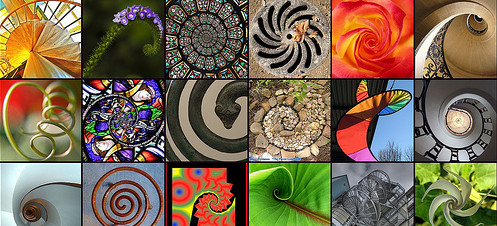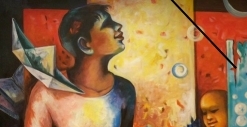Have you noticed how personal believes and values change over time? My attitude to life today differs from that ten years ago. Formation and evolution of beliefs differ from one individual to another, as they are affected by temperament and cultural environment. But it seams that there are also certain universal traits in work here.
Looking back at how my own beliefs have changed over time, I am tempted to think that this is more than just my personal journey. Combining my personal experience with educated speculation I suggest that evolution of beliefs can be at least partially traced to the circumstances of every age.
Teens: Nihilism
While I wasn’t a violent or an aggressive teenager, I was certainly a cynical one. Proclamation of higher motives I met with extreme skepticism, much more willing to believe in hidden interests than in genuine causes. I believed that sex and money rule the world. That everything can be bought and sold. That nothing that can’t be seen or touched is real. In this age the parents are no longer held in high esteem, they look ridiculously detached from adolescent’s reality. The school is perceived as being hypocritical, politicians are crooks, the media is biased, conspiracy is more likely than contingency, justice is only for the rich.
Such cynicism is quite typical in this age. Adolescence is a time of questioning authority, asserting personality, pushing the limits. It’s a time of revolt against the culture, the accepted norms and values, the common ethos. It’s a part of a normal process of growth. Only through distancing himself from the prevalent culture can the adolescent form his identity.
Early Adulthood: Materialism
As a young adult in my twenties I was becoming preoccupied largely with developing my career. First undergraduate studies in the university, than the beginning of a professional work in the army, I was concerned with securing my financial future. Preoccupation with ensuring high living standards, nice salary, a car, a first trip abroad – these are all marks of this age.
Twenties is a time of professional achievement. The revolting spirit of adolescence is substituted for an effective approach of working inside the system for your own good, rather than working against it. Instead of openly criticizing and questioning the rules and norms, they are used for own benefits. There is no much respect for the ethos of the older generations, but open contempt is now replaced with cynical adoption. The only goods that are valued are material ones. If in adolescence the little money that was available was to be spent on escaping boredom, now it is to be spent on accumulating material goods.
Late Twenties: Technophilia
After quenching the first material thirst, I was starting to notice the stark difference between the way of living of my generation, and that of the generation of my parents. Beyond the superficial layer of technological progress, I was becoming aware of the significant prosperity the Information Age has brought. Personal computers, mobile phones, the Internet seemed brought not only concrete technological improvement into our lives, but also the optimistic spirit of “everything is possible”.
Fascination with technology, that some acquire in an earlier age, develops in this age into a full-fledged technological evangelism. Materialistic indifference to the world at large is transformed into a somewhat arrogant self-assurance that anything can be fixed with technology. Poverty, hunger, corruption – no problem is too big. Technology is deemed to be the liberator of the human spirit – freedom can be broadened, diseases cured, death postponed.
Thirties: Humanism
Today, approaching my thirties, I find meaning not in bashing culture, accumulating goods or admiring technology, but rather in deep personal relationships. I see the universe as a cold and chaotic place, devoid of any inherent meaning. And in this void stands a little figure of man, that finds his only hope and solace in his companionship with other, equally puzzled and lonely men. Meaning is not derived from a top-down plan but rather from the experience of connecting and sharing a common existence with other human beings.
Love, altruism, empathy – these are no longer empty words. They are the fundamental bricks on which happiness may be built. And though most people in this age know already their share of disappointments and regrets, we still hope that harmony and inner peace can be achieved through understanding and acceptance of other human beings. Freedom, dignity, responsibility, duty are stripped of their dogmatic and moralistic connotations and are perceived as essential attributes of human society. They are no longer laughed at or neglected, but appreciated and defended. For the first time the ethos of the humanistic culture is deemed not only plausible but even necessary.
Forties-Sixties: Spirituality
If the thirties is a time of adulthood coming into its prime, of professional achievement, of starting a family and building a home, than the following decades may turn to be the time of questioning yourself, of undermined confidence. As a result of a personal crisis, either in relationships (divorce, the death of parents), or in work (job termination, career changes) people often grasp for something larger in their life to account for the setbacks and give strength to endure them.
When natural and immediate systems of meaning, such as work and relationships fail, when cosmic loneliness of man is impossible to bear anymore, people turn to more complex and abstract systems of meaning. Revealed religion, New Age sensibility, mysticism, Western philosophy, Eastern traditions, Nature can be sought to fill the spiritual void. These systems tend to distance the man from the immediate circumstances of his life, and give him strength by exposing him to some greater life truths. Whether through Buddhism or Pantheism, man finds comfort and reassurance in knowing that he is a part of something larger, beautiful and eternal.
Sixties-Seventies: Common Sense
After looking for truth, knowledge and happiness is esoteric realms, people often find it in simple and banal life joys. The tenderness of life-long partner, the time spent with grandchildren, slow walks in the country side. It’s a time of nurturing, of passing knowledge, of leaving a legacy. As most of the life has been left in the past, it’s time of dwelling on memories, writing memoirs, collecting memorabilia. Some tend to nostalgia, others, seeing how their children and grandchildren are wiser than they were, may look at the future with optimism.
Coming full circle since the days of adolescence, people in this age find meaning in immediate and observable things, but these are not money, power or fame, but rather a family life, professional recognition and friendship. If adolescence is the time of pushing the boundaries, old age is the time of maintaining them. If there is some cynicism targeted at the spirit of current times, than it is out of regret and a sense of loss, rather than of spiteful revolt.
Your Turn
While this simplistic pattern obviously can’t represent the variety of ways human lives unfold, it stands to show how our common condition affects the development of our beliefs. How similar or different is your own spiral? It’s your turn now.



Wow.
Dude, you are wasted in high tech.
You should have studied philosophy!
That post really made me sad and happy at the same time.
Sad because it is obviously true that we are alone in this world, and that the meaning of all that surrounds us is purely subjective.
But it also made me happy, because it is nice to know that there are still thinking people in the world (like yourself), that are not 100% technocrats,
and value other humans.
Although, I don’t agree completely with what you’ve said, I agree with the spirit of this post.
In each and every one of us, there is a fight between a cynical pragmatist, and an idealistic dreamer –
I think that in order to be content, One should find the balance between the two.
Thanx, I appreciate your kind words.
So, are you in the humanist phase of the spiral? I sense that there are some nihilistic overtones in your beliefs and opinions, am I wrong?
Heh.
You’ve hit the point of it.
I’ve been thinking about what I am in this sense for a long long time.
Being a moral nihilist is entirely logical and rational, but something deep within me doesn’t let me take that path all the way,
Although i KNOW this is the rational view of things.
The closest to what I can agree with is:
Maintaining a fine balance between being “good” and being “rational” in personal life.
and being entirely “rational” in state issues, Machiavelli style.
I just returned from friend’s house warming party. It was a typical russian-style evening – lot’s of food, alcohol, loud laughs and voices. Amidst all the happy noice I was having an argument with a nihilist couple. I don’t remember the details, but we argued about whether such things as freedom, love, happiness exist at all. The evening went on, and after a while I noticed that they were sitting weary and sleepy, holding hands and slightly leaning to each other. Their mutual tenderness and warmth was obvious.
And I was happy to see that. We may not believe in many things, but that doesn’t make us less human.
Wow.
Dude, you are wasted in high tech.
You should have studied philosophy!
That post really made me sad and happy at the same time.
Sad because it is obviously true that we are alone in this world, and that the meaning of all that surrounds us is purely subjective.
But it also made me happy, because it is nice to know that there are still thinking people in the world (like yourself), that are not 100% technocrats,
and value other humans.
Although, I don’t agree completely with what you’ve said, I agree with the spirit of this post.
In each and every one of us, there is a fight between a cynical pragmatist, and an idealistic dreamer –
I think that in order to be content, One should find the balance between the two.
Thanx, I appreciate your kind words.
So, are you in the humanist phase of the spiral? I sense that there are some nihilistic overtones in your beliefs and opinions, am I wrong?
Heh.
You’ve hit the point of it.
I’ve been thinking about what I am in this sense for a long long time.
Being a moral nihilist is entirely logical and rational, but something deep within me doesn’t let me take that path all the way,
Although i KNOW this is the rational view of things.
The closest to what I can agree with is:
Maintaining a fine balance between being “good” and being “rational” in personal life.
and being entirely “rational” in state issues, Machiavelli style.
I just returned from friend’s house warming party. It was a typical russian-style evening – lot’s of food, alcohol, loud laughs and voices. Amidst all the happy noice I was having an argument with a nihilist couple. I don’t remember the details, but we argued about whether such things as freedom, love, happiness exist at all. The evening went on, and after a while I noticed that they were sitting weary and sleepy, holding hands and slightly leaning to each other. Their mutual tenderness and warmth was obvious.
And I was happy to see that. We may not believe in many things, but that doesn’t make us less human.
Thanks for the post, Mick! It was interesting to know your view on people’s system of values. Especially i liked that you separately define the stage of ‘Technophilia’. I think i’ve experienced it only to some extend. As for me i can only say that my ‘evolution’ was not so linear. Humanism – nihilism – idealism/spirituality – dissapointment/nihilism again – materialism and then a mixture of them all at the same time (common sense prevaling :)).. It’s kind of a unity stage.. I find some nihilists so charming and some materialists so good-hearted and some ‘spiritual’ people seem more hypocritic than the others… Life seems more complex and more beautiful. it’s a long way towards maturity after all.. Who knows what’s next?
Hi Saryuna, welcome 🙂
It’s interesting that your beliefs path was so intricate. How would you explain it? Is it because of your life circumstances, or the influence of people around you?
I think that in the end, no single ideology/school of thought/discipline can provide us with all the answers and all the clues we needs. We take something here and something there, and build our own system of beliefs. It may not be structured as rigourously and analitically as some dogmas, but it reflects the unique nature of our identity and culture.
Thanks for the post, Mick! It was interesting to know your view on people’s system of values. Especially i liked that you separately define the stage of ‘Technophilia’. I think i’ve experienced it only to some extend. As for me i can only say that my ‘evolution’ was not so linear. Humanism – nihilism – idealism/spirituality – dissapointment/nihilism again – materialism and then a mixture of them all at the same time (common sense prevaling :)).. It’s kind of a unity stage.. I find some nihilists so charming and some materialists so good-hearted and some ‘spiritual’ people seem more hypocritic than the others… Life seems more complex and more beautiful. it’s a long way towards maturity after all.. Who knows what’s next?
Hi Saryuna, welcome 🙂
It’s interesting that your beliefs path was so intricate. How would you explain it? Is it because of your life circumstances, or the influence of people around you?
I think that in the end, no single ideology/school of thought/discipline can provide us with all the answers and all the clues we needs. We take something here and something there, and build our own system of beliefs. It may not be structured as rigourously and analitically as some dogmas, but it reflects the unique nature of our identity and culture.
Shalom Misha,
It’s good that I found you in Facebook:) Long time no see:)
I really enjoyed reading your blog, there are many things I often think of, and in the similar way. I must say that today, also approaching my thirties, I find myself in the similar position (although there still are some differences) 🙂
I like your opinion on subjects that people often do not concern themselves with, but rather prefer “flowing” with time. Great!
Shalom Misha,
It’s good that I found you in Facebook:) Long time no see:)
I really enjoyed reading your blog, there are many things I often think of, and in the similar way. I must say that today, also approaching my thirties, I find myself in the similar position (although there still are some differences) 🙂
I like your opinion on subjects that people often do not concern themselves with, but rather prefer “flowing” with time. Great!
Hey man, it’s great to hear from you. Thank you for your kind words.
Socrates said that the “unexamined life isn’t worth living”. I think that the unexamined life is a sure recipe for regrets and guilt in the future. So while “just living it” might be a good advice for teenagers busy with exploring the world, I think that it just doesn’t work anymore as we age.
Tried to listen to your tracks in Myspace, but they didn’t play for some reason. Tried both, Firefox and Explorer with no luck.
Yes, that and me being a very reflexive person:)
Regarding the tracks – this is strange. I played them with Chrome & Explorer, and both worked. However, I sent these tracks to your Gmail, hope you like them!
Hey man, it’s great to hear from you. Thank you for your kind words.
Socrates said that the “unexamined life isn’t worth living”. I think that the unexamined life is a sure recipe for regrets and guilt in the future. So while “just living it” might be a good advice for teenagers busy with exploring the world, I think that it just doesn’t work anymore as we age.
Tried to listen to your tracks in Myspace, but they didn’t play for some reason. Tried both, Firefox and Explorer with no luck.
Yes, that and me being a very reflexive person:)
Regarding the tracks – this is strange. I played them with Chrome & Explorer, and both worked. However, I sent these tracks to your Gmail, hope you like them!